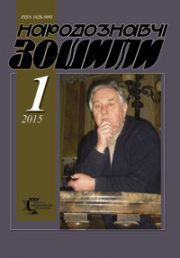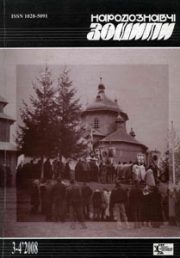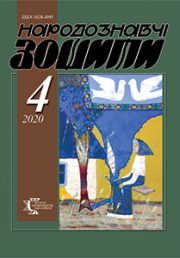The Ethnology Notebooks. 2022. № 2 (164), 417—440
UDK [[801.81:398.22]:[314.745.25:[332.2:81’37]]](477)”194/196″
DOI https://doi.org/10.15407/nz2022.02.417
PASTUKH Nadia
- ORCID ID: https://orcid.org/0000-0001-7703-5541
- Candidate of Philological Sciences (Ph. D. in Philology),
- Senior Researcher at the Ethnology Institute
- of the National Academy of Sciences of Ukraine,
- 15, Svobody Avenue, 79000, Lviv, Ukraine,
- Contacts: e-mail: npastukh@gmail.com
Abstract. On the basis of folk stories about the loss of land as a result of forced resettlement of Ukrainians in the 40—60’s of the twentieth century, the author analyzes the concept of «land». The research is based on the materials of the folklore records, which the author together with her colleague Olga Kharchyshyn recorded in Zastavna district of Chernivtsi region (2018), Nadvirna district of Ivano-Frankivsk region (2019) and in Starosambir district of Lviv region (2021) and which are stored in the Archive of the Institute of Ethnology of the National Academy of Sciences of Ukraine; on the materials of records of Oksana Kuzmenko and Irina Koval-Fuchilo, which are in the private collections of folklorists, as well as on the recordings of Eugene Lunyo, presented in his collections of memoirs about the insurgent movement in Yavoriv region. The urgency of the article is due to the need to clarify and comprehend the new meanings and motifs of the folklore concept of «earth» in the twentieth century, as they still remain on the periphery of scientific horizons due to temporal proximity and formal inconsistency of the material. We mean first of all the folklore of the Ukrainian Resistance of the XX, in which the theme of land in connection with imperial wars, mass deportations and migration in general, socialization and confiscation of land, urbanization and modernization of society has acquired special significance and rethinking, sharpened traditional meanings and angles of vision. The object of the research is folk stories about the forced eviction of Ukrainians from their homes in the 40—60s of the twentieth century and deportation to Siberia, the Urals, Kazakhstan and other remote areas of the USSR, and the subject — the concept of «land» and folklore motifs and plots in which he appears. The purpose of this article is to shed light on the lexical and semantic field of the concept of «land», its component composition, longevity of tradition and dynamics of meaning in the context of motifs and plots of folk stories about land loss due to Ukrainian resettlement in the 40—60s of the twentieth century.
Keywords: displacement of Ukrainians, the concept of land, folk story, special settlements, Ukrainian Insurgent Army (UPA), banderas.
Received 20.05.2022
REFERENCES
- Berezovsky,I. P. (Ed.). (1962). Riddles. Kyiv [in Ukrainian].
- Franko, I.Ya. (1980). The power of the earth in the modern novel. In Franko, I.Ya. Collected works in fifty volumes. (Vol. 28, pp. 176—195) [in Ukrainian].
- Bulashev, G.O. (1992). The Ukrainian People in their Legends, Religious Views and Beliefs. Kyiv [in Ukrainian].
- Panekina, T.I. (2000). The concept of land in Ukrainian proverbs and sayings. Notes on Ukrainian linguistics (Issue 9, pp. 99—108) [in Ukrainian].
- Shurko, L.T. (2001). The image of the earth in the Ukrainian and world heroic epoch: The Thesis for the Academic Degree of Doctor of Philological Sciences with a Specialization in Folkloristic. Kyiv [in Ukrainian].
- Snigiryova, L. (2012). Symbols «water», «fire», «wind», «earth» in Ukrainian folk historical songs of the XV — early XVIII centuries. Literature. Folklore. Problems of poetics. Collection of Scientific Works (Issue 36, pp. 263—272) [in Ukrainian].
- Оhar, А. (2019). Verbalisation of the WAR Concept in Modern Art Discourse. Native word in ethnocultural dimension. Collection of Scientific Works (Pp. 38—47) [in Ukrainian].
- Khalyuk, L. (2013). Oral folk stories of Ukrainians-settlers from Lemkivshchyna, Kholmshchyna, Podlasie and Nadsyannia: genre-thematic specificity, poetics features. Kyiv [in Ukrainian].
- Kuzmenko, O. (2018). Dramatic human existence in Ukrainian folklore: conceptual forms of expression (the period of WWI and WWII). Lviv: Institute of Ethnology of the National Academy of Sciences of Ukraine [in Ukrainian].
- Kuzmenko, O. (2016). Semantics of spatial images in Ukrainian folklore of the twentieth century. (The concept of «Lost House»). Bulgarian Ukrainian Studies (Issue 6, pp. 72—80) [in Ukrainian].
- Koval-Fuchylo, I. (2016). The concept of home in the stories of forced relocation. Lemkos, Boykos, Ruthenians: history, modern times, material and spiritual culture (Vol. 6, pp. 147—158) [in Ukrainian].
- Kachmar, M. (2020). Folk Stories about Deportation of Ukrainians from Zakerzonnia in 1940s: Folklore and Historical Memory (on Materials of the Village Tulyholovy of Horodok Discrit of the Lviv Region). The Ethnology Notebooks, 3 (153), 573—584 [in Ukrainian].
- Lunio, Ye. (2005). Yavoriv Region in the Insurgent Struggle. Stories of Participants and Eyewitnesses (Vol. 1). Lviv [in Ukrainian].
- Lunio, Ye. (2015). Yavoriv Region in the Insurgent Struggle. Stories of Participants and Eyewitnesses (Vol. 2). Lviv [in Ukrainian].
- Lunio, Ye. (2021). The Insurgent Struggle in the Stories of Participants and Eyewitnesses (Vol. 3). Lviv; Drogobych: Kolo [in Ukrainian].
- Slyunina, O.V. (2012). Archetypal concept of land in the linguistic and cultural aspect. Scientific notes (National University «Ostroh Academy») (Issue 24, pp. 266—269) [in Ukrainian].
- Kumlyk, R., Nagirnyak, V., & Zvenigorodskaya, L. (Ed.). (2015). Hutsul songs. Chernivtsi: Druk Art [in Ukrainian].
- Koval-Fuchylo, I. (Ed.). (2012). Lamentation. Kyiv [in Ukrainian].
- Kostomarov, N.I. (1863). The legend of the incestuous man. In Kostomarov, N.I. Historical monographs and researches (Vol. 1, pp. 329—258). St. Petersburg: Public benefit [in Russian].







